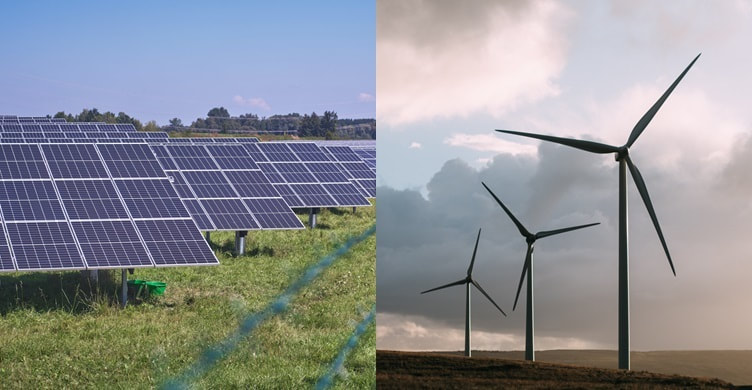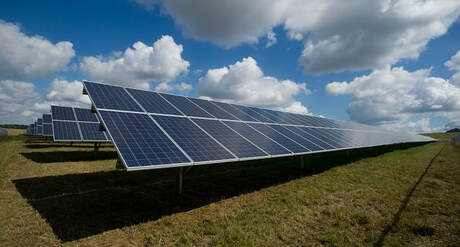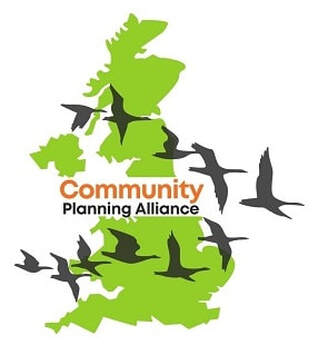(Site Path: Resources | Non-housing Campaigns | Renewables)
Renewables Resources
|
Community Planning Alliance is supportive of the need for renewable energy.
That said, as with all planning decisions, it is essential that all factors are considered in the location of renewable installations. Those factors must include: community engagement; impact on the environment; whether a proposal is in the 'right place'.
|
|
The right place will vary according to the type of renewable proposed, but, for example, we have great concern about the proliferation of huge solar 'farms' on best quality agricultural land. Conversely, we believe that all new builds should have mandatory solar panels fitted.
Planning Practice Guidance for renewable and low carbon energy - courtesy of GOV.UK
This Government guidance provides advice on the planning issues associated with the development of renewable energy.
Solar Power
|
Our food-growing countryside is being covered by a sea of photovoltaic solar panels and no-one is monitoring the amount of land affected.
High grade farmland is being covered by solar panels and shut off behind high fences.
Historic rural views are being industrialised.
|
|
In the first few days of 2022 alone, four more vast solar 'farms' have been announced in the Chilterns, covering between 160 and 340 acres each. Whilst in Kent, the 'Raspberry Hill Solar Park' could cover 290 acres of farmland near Iwade.
Yet, despite The Guardian revealing that 2021 saw "a nine-year high in the number of solar farm applications to connect to the UK Power Networks grid ... despite the Covid-19 pandemic", these applications are not being monitored by Government. (Except for the very biggest schemes, which are handled under a separate planning regime called the Nationally Significant Infrastructure Projects.)
In light of the above, the Community Planning Alliance is concerned that, in addition to the large scale loss of prime agricultural land, at the end of the operational period of these solar ‘farms’, there is a risk that landowners will claim these installations now mean that the land is brownfield/previously used, and seek planning permission for housing or other developments.
We therefore believe that Government must:
- Create a national database showing hectares of land now devoted to photovoltaic solar panels as the first stage of a national land use strategy;
- Enforce and incentivise solar panels on all new build homes and commercial premises.
For further solar-related facts and figures, please see this blog by our Founder, Rosie Pearson and/or refer to the resources below.
CPA Webinar: All about solar 'farms'
Solar promoters are contacting farmers and offering them far more money than they could earn growing food. Yet the cumulative impact on the environment, biodiversity and food security is not understood. Nor are the risks of batteries being taken into account.
At this event, jointly hosted with the Solar Campaign Alliance on April 21st 2022, we heard from three expert speakers:
- Professor Michael Alder, who gave us an overview of the Solar Campaign Alliance, and discussed national food security and the biodiversity impact of solar farms.
Michael is a Professor (Emeritus) of Rural Environment at Essex University, FRAgS, DL, and former principal of (the now known as) Writtle University College for 20 years.
- Richard Haynes BSc, who talked about the impact of solar farms on landscape and heritage settings.
Richard obtained a degree in Estate Management from University of Reading before becoming a Chartered Surveyor. His career was spent in private practice but he worked almost exclusively for central and local government, regularly appearing as an expert witness in planning inquiries. He is currently a Trustee of CPRE Essex.
- Dr Edmund Fordham, who told us all we need to know about battery storage.
Edmund is a a physicist and engineer in the energy industries, CPhys, CEng, FInstP.
Solar Farm Planning Officer Pack - courtesy of Braintree District Council
A Planning Officer pack setting out the various policies relating to solar with respect to an application.
A good example of the sorts of things you can look out for if you are dealing with a solar proposal.
Solar Farm Planning Decision Notice - courtesy of Braintree District Council
An example of a Local Authority outline planning approval for a solar farm on greenfield land.
Note in particular the conditions, such as no 10, which cites the need for land to be reinstated to countryside use at end of life of the panels.
National Infrastructure Planning - courtesy of GOV.UK
If you wish to learn more about the bigger solar proposals, submitted through the NSIPs programme, please search the Planning Inspectorate website.
Do you have or know of any resources that should be included in this library?
If so, please contact us today!



